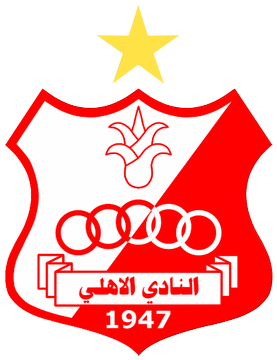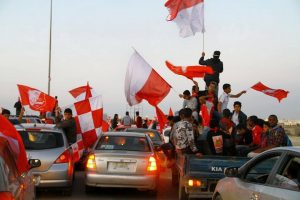By Ayman Muftah and Michel Cousins.

Benghazi/Tunis, 19 April 2017:
Al-Ahly Benghazi football team is marking its 70th anniversary this week with celebrations peaking tomorrow, Thursday, at its Benina stadium when the much-loved club will take on Tripoli’s Al-Ittihad in a friendly match.
On Tuesday, the celebrations began as fans took to the streets adorned in Al-Ahly’s red strip, waving the club flag. There are exhibitions to celebrate the club’s history and its players, together with a number of cultural evenings and seminars.
The club, Libya’s oldest, has had something of a momentous history which at times has reflected that of the country. Today the club is seen as almost wholly concerned with football. But it was not always so. Founded in 1947, it started life with somewhat different ideas.
In the aftermath of the World War II, when the British were running Cyrenaica and planning to give it independence as a state in its own right, political associations were banned. Cyrenaican activists got round the ban by founding sports clubs. One of them was Ahly, started by members of the Senussi movement in memory of Libyan resistance hero Omar Mukhtar.
Once Libya became independent, the political link faded and the club flourished. Even so, during the Qaddafi regime, it was almost brought to extinction because of its traditions and the hatred of Saadi Qaddafi.

Given the rivalry between Benghazi and Tripoli, it was inevitable that there would be sharp competition, even a certain enmity, between it and Alhi Tripoli, founded in 1950, over the use of the name. Football-crazy Saadi captained Ahli Tripoli and over time became determined to crush the rival team. Being his father’s son allowed him to make it happen.
Top players were lured away, politically-obliging referees would give penalty points against it. Matters reached a climax in 2000 when the club was fighting against Ahli Tripoli. Inevitably the referee started handing penalties against Ahly after it took the lead with a first goal. As a result the team walked off the field but were ordered back to finish the match. The Tripoli team won 3-1.
By the next match, against Beida’s Al-Akhdar, the club was facing relegation from the premier league. This time, when the referee awarded a penalt, the outraged fans invaded the pitch. The match had to be abandoned.
The fans then took to the streets of Benghazi with a donkey dressed in Ahli Tripoli’s colours and bearing Saadi’s number.
The wrath of Saadi and his father was instant. Fans were arrested and three were condemned to death although the sentences were never carried out. One died in unexplained circumstances in jail, however; the other two were freed five years later.
The club itself was closed and its offices and training grounds bulldozed. In response, the fans gathered in protest at Benghazi city’s most famous monument, Omar Mukhtar’s mausoleum. “We are Omar Mukhtar’s grandsons,” they shouted, referring to the club’s connection with freedom-fighter. “We are not afraid of Abu Minyar” (the Qaddafi family surname.)
An outraged Qaddafi responded by destroying the mausoleum, removing Omar Mukhtar’s body and reburying it near his own father’s grave in Soloug.
In 2005, Qaddafi finally allowed the club to start again, three years later giving it some 30 hectares of prime sea-side land in west Benghazi, making it potentially the richest club in the country – except that for the moment, it does have the money to develop it.
The club has won the Libyan Premier League four times, the last time being in 1992.
Ahly, though, is not just a football club. It also has volleyball and basketball teams. That is partly because it started life as a general sports club. But it is aslo because Qaddafi, who distrusted sports which he said had to be for the masses, not for individuals or small groups, insisted on keeping things that way. Football was fine because it had mass following (and Saadi Qaddafi to promote it) but other sports with a limited followings were not.










